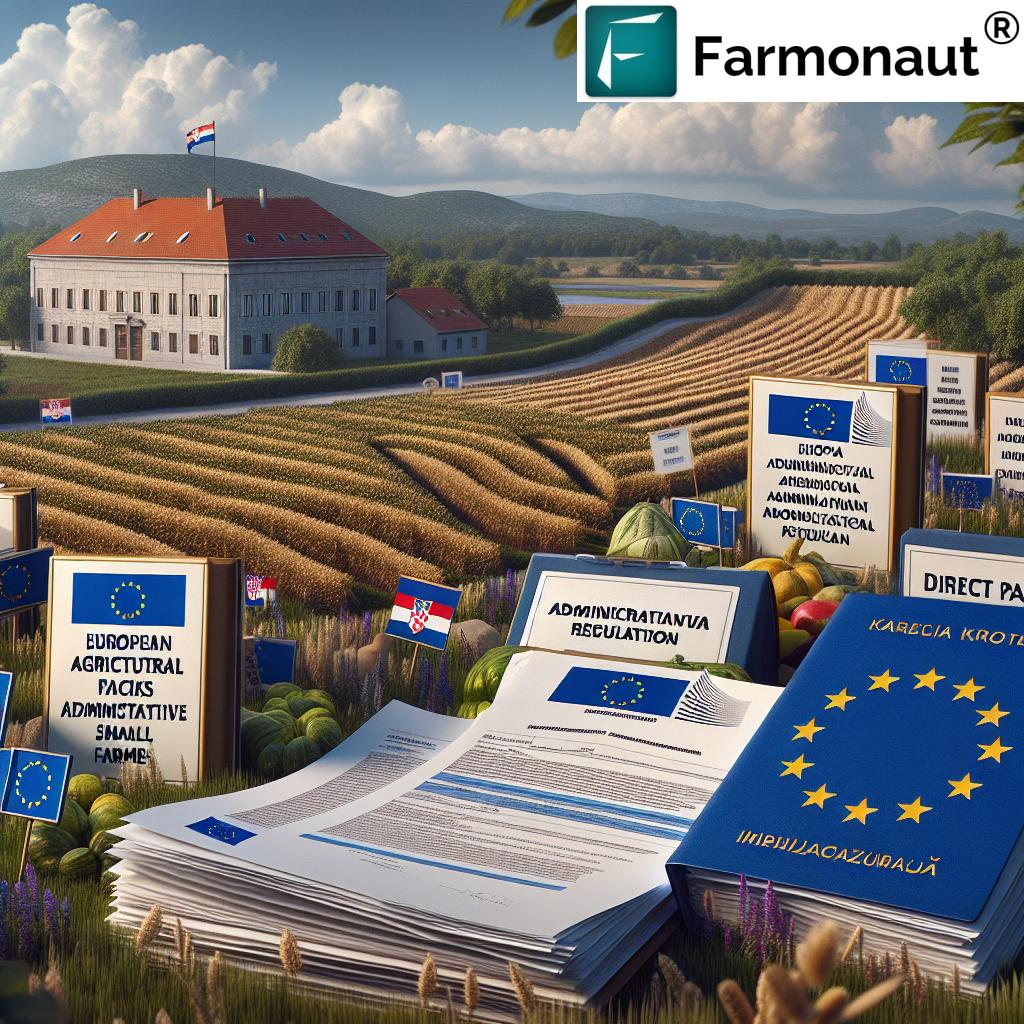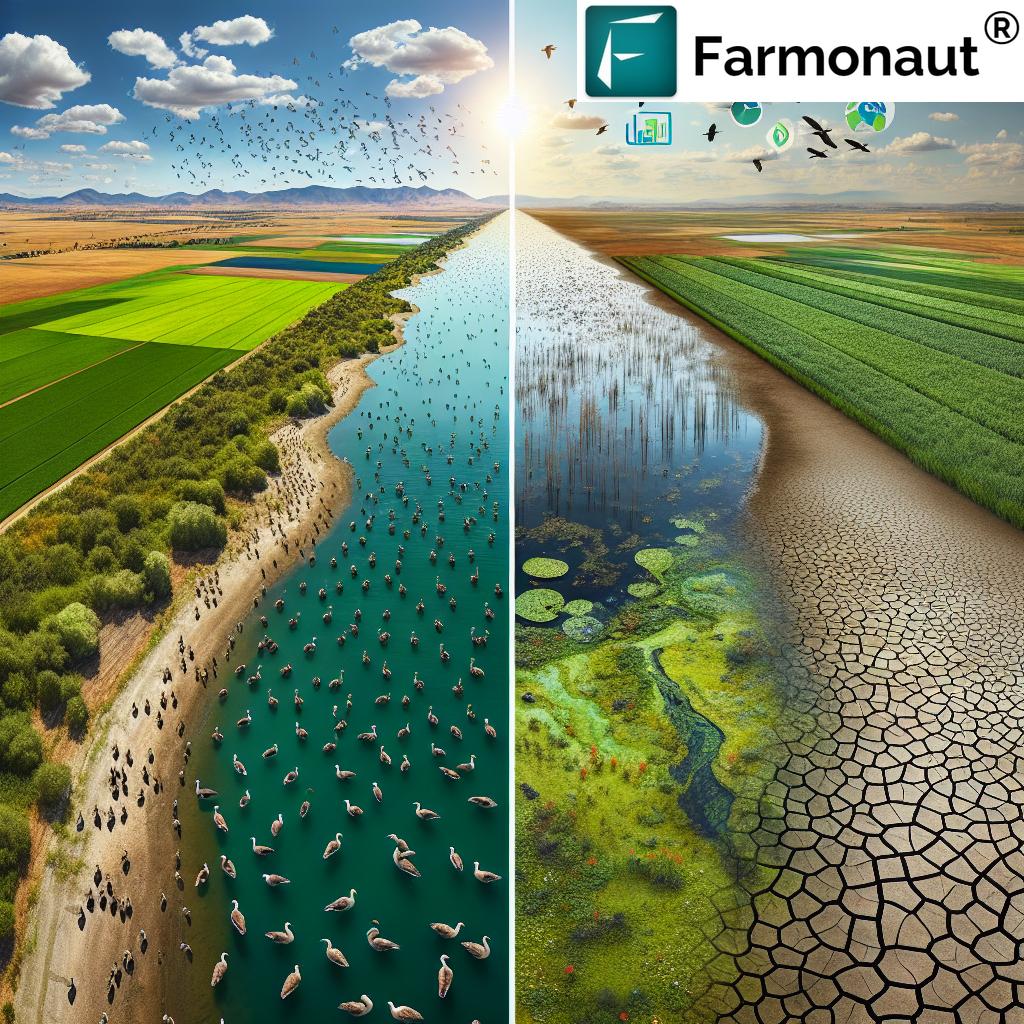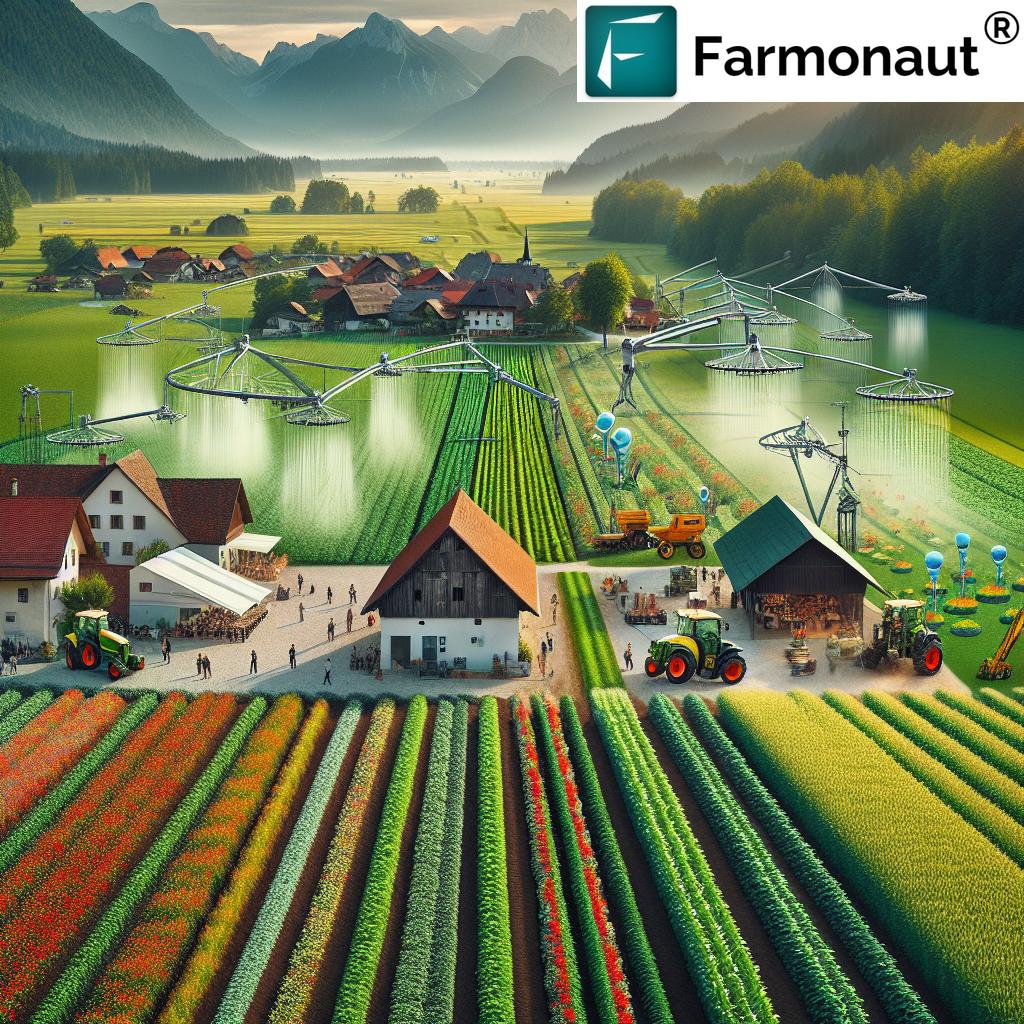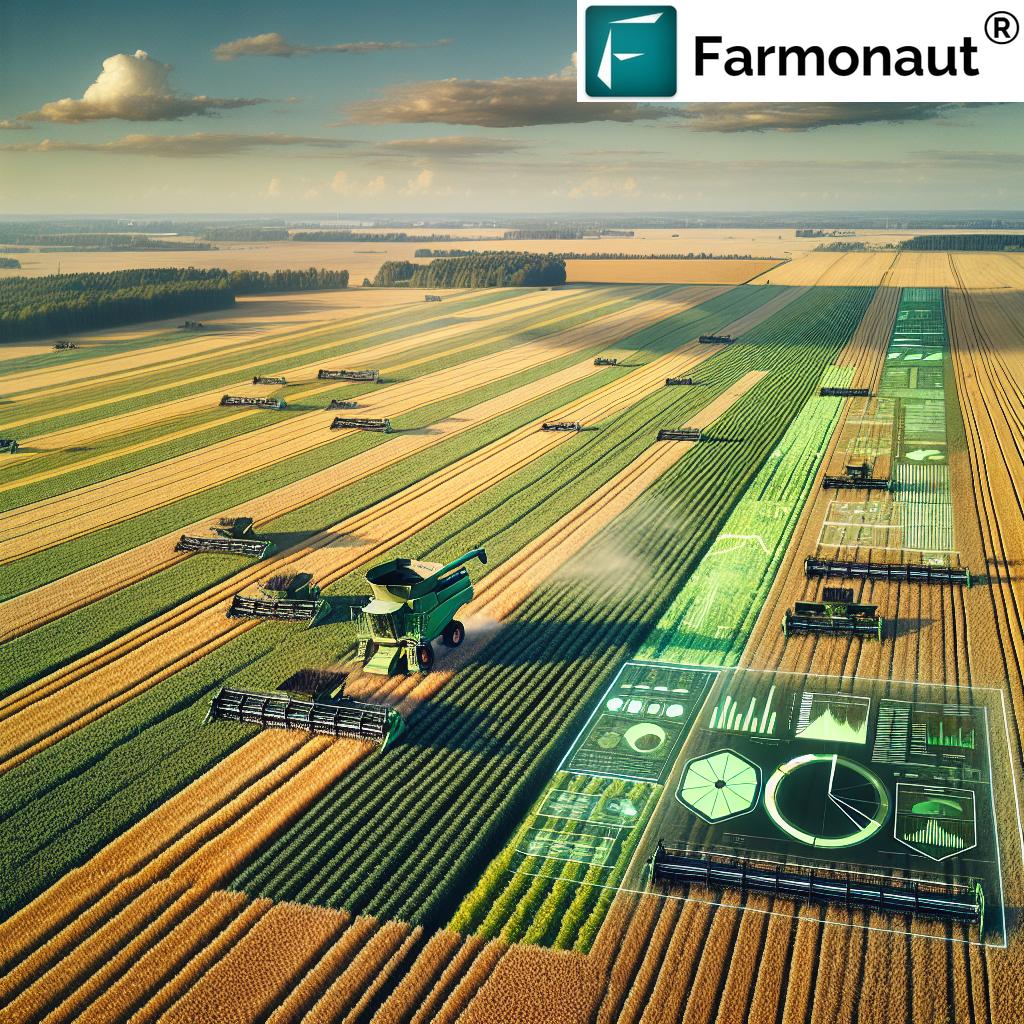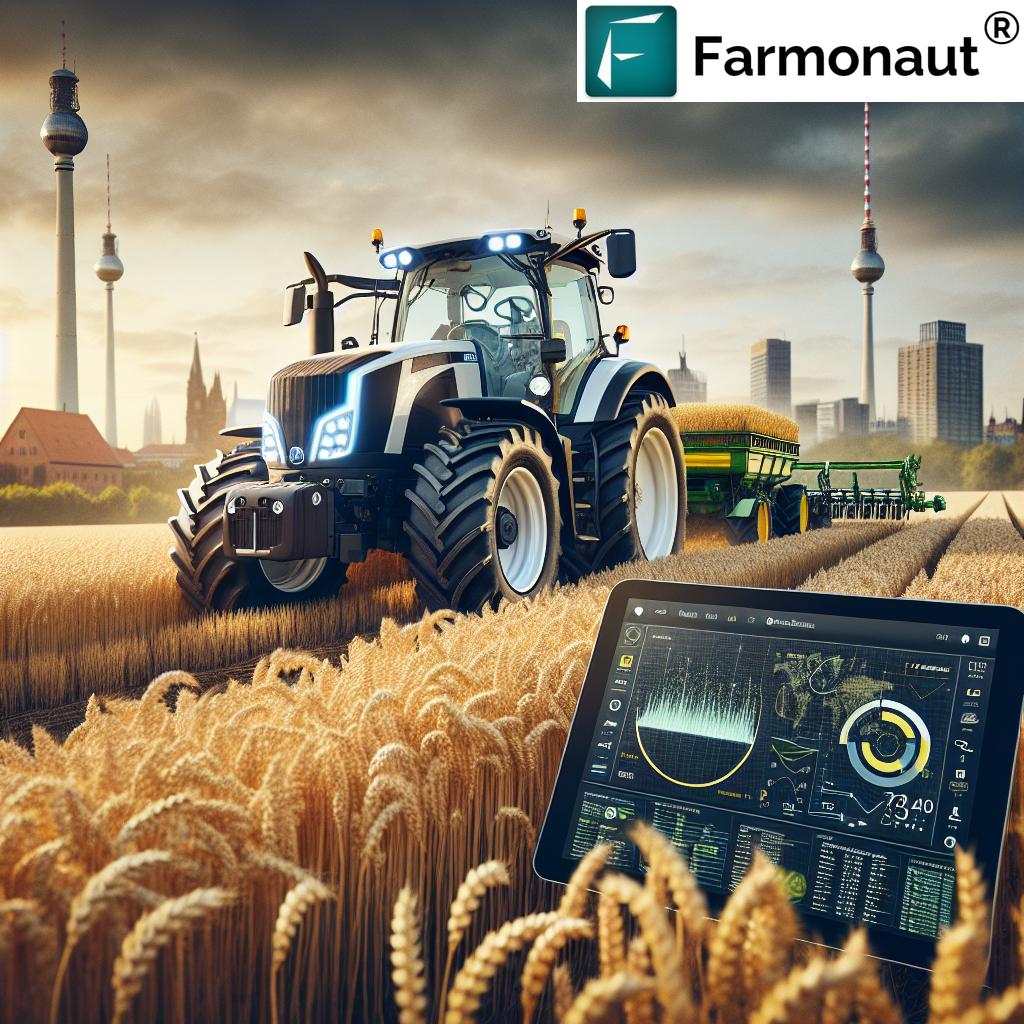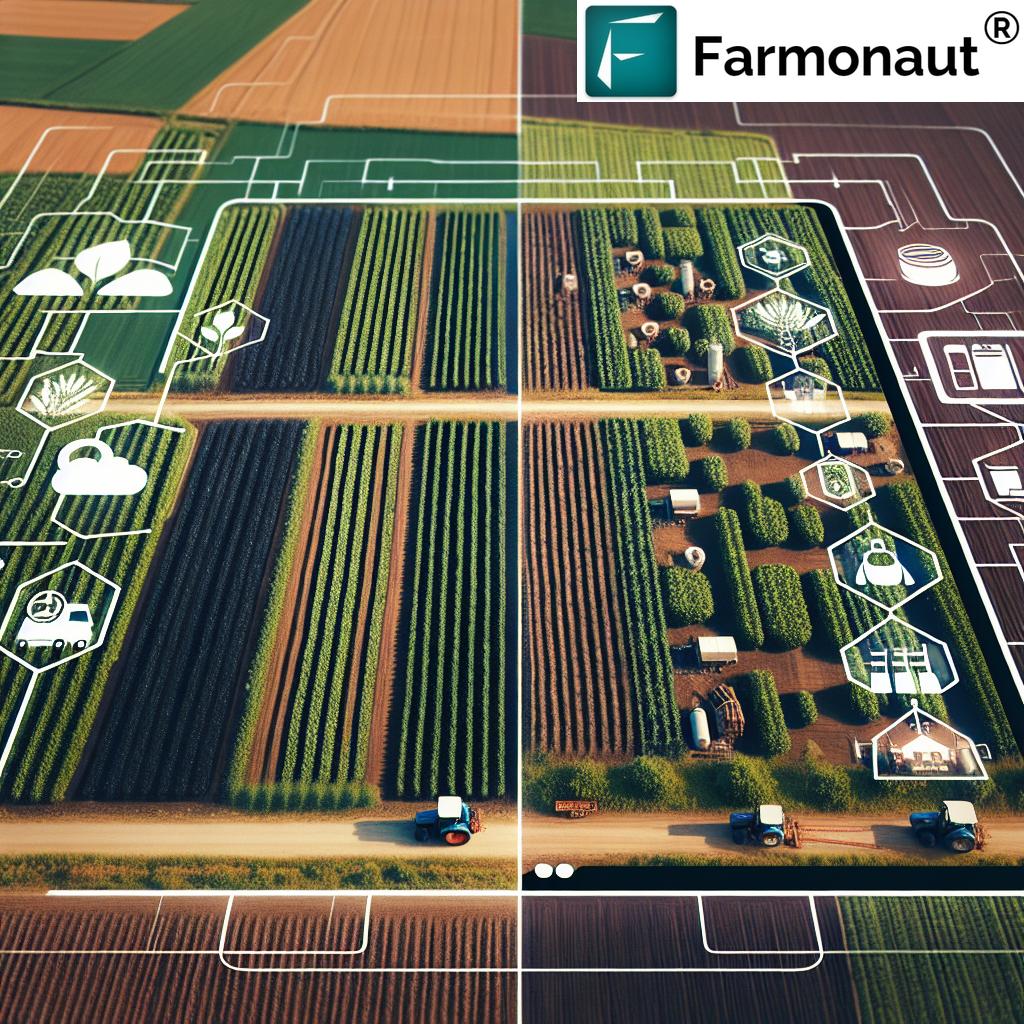Empowering Women in European Farming: Bridging the Gender Gap for Sustainable Rural Development
“Despite women’s crucial role in European farming, only 30% of farm managers are female.”
In the verdant fields of Europe, a quiet revolution is taking place. Women in European farming are not just tilling the soil; they’re sowing the seeds of change, driving agricultural innovation, and reshaping the landscape of sustainable rural development. Yet, as we delve into this crucial topic, we’re confronted with a stark reality: the gender gap in agriculture remains a significant challenge, one that demands our attention and action.
At Farmonaut, we recognize the pivotal role women play in the agricultural sector and are committed to supporting their journey through innovative technology. Our satellite-based farm management solutions are designed to empower all farmers, regardless of gender, with the tools they need to thrive in an ever-evolving agricultural landscape.

The Current Landscape: Women in European Farming
The story of women in European farming is one of resilience, innovation, and untapped potential. Despite comprising a significant portion of the agricultural workforce, women often find themselves underrepresented in leadership roles and decision-making processes. Let’s explore the current state of affairs:
- Family farm management: Women play a crucial role in 96% of European farms, which are family-run operations.
- Gender balance in agriculture: Only 30% of farm managers across Europe are women, highlighting a significant disparity.
- Rural economy diversification: Women are at the forefront of diversifying farm activities, introducing innovative business models and sustainable practices.
These statistics paint a picture of both progress and persistent challenges. While women are integral to the farming ecosystem, their contributions often go unrecognized or undervalued. This gender imbalance not only affects individual farms but also has broader implications for sustainable rural development and the future of European agriculture.
The Role of Women in Agricultural Innovation
Women in European farming are not just maintaining the status quo; they’re driving innovation and sustainability in numerous ways:
- Sustainable Practices: Women farmers are often at the forefront of adopting environmentally friendly farming methods, aligning with the EU’s Green Deal objectives.
- Diversification: From agritourism to direct-to-consumer sales, women are finding creative ways to diversify farm income streams.
- Technology Adoption: Many women farmers are embracing precision agriculture tools, like those offered by Farmonaut, to optimize crop management and resource use.
Our Jeevn AI Advisory System at Farmonaut is particularly beneficial for farmers looking to innovate. It provides personalized recommendations based on satellite data, helping farmers make informed decisions about crop management and resource allocation.
Challenges Faced by Women in European Agriculture
Despite their contributions, women in farming face numerous obstacles:
- Access to Land: Women often struggle to acquire or inherit farmland due to traditional practices and legal barriers.
- Financial Constraints: Limited access to credit and financial services can hinder women’s ability to invest in their farms.
- Representation: Women are underrepresented in agricultural decision-making bodies and policy forums.
- Work-Life Balance: The demands of farm work often conflict with family responsibilities, disproportionately affecting women.
Addressing these challenges is crucial for achieving gender balance in agriculture and fostering sustainable rural development. At Farmonaut, we’re committed to making our technology accessible to all farmers, helping to level the playing field regardless of gender.
Initiatives and Awards Recognizing Women’s Contributions
Across Europe, various initiatives and awards are shining a spotlight on women’s achievements in agriculture:
- EU Prize for Women Innovators: Recognizes outstanding women entrepreneurs in EU-funded projects, including those in agriculture.
- Copa-Cogeca Innovation Award for Women Farmers: Celebrates innovative practices by women in European farming.
- Rural Inspiration Awards: Highlights successful projects in rural development, many led by women.
These recognitions not only celebrate individual achievements but also inspire the next generation of women in agriculture. They demonstrate the vital role women play in agricultural leadership and innovation.

Policy Support for Women Farmers in Europe
European agricultural policies are increasingly recognizing the need to support women farmers:
- Common Agricultural Policy (CAP): The new CAP reform includes measures to promote gender equality in agriculture.
- Rural Development Programmes: Many EU countries have implemented specific measures to support women entrepreneurs in rural areas.
- Gender Mainstreaming: The EU is working to integrate gender perspectives into all agricultural and rural development policies.
These policy initiatives aim to create a more inclusive and equitable agricultural sector. However, their effectiveness depends on consistent implementation and monitoring at both the EU and national levels.
“Family-run operations constitute 96% of European farms, highlighting the importance of gender balance in agriculture.”
The Impact of Women on Rural Economy Diversification
Women farmers are playing a pivotal role in diversifying the rural economy, contributing to the sustainability and resilience of rural communities:
- Agritourism: Many women-led farms are opening their doors to tourists, offering farm stays and educational experiences.
- Value-Added Products: Women are often at the forefront of creating artisanal products from farm produce, boosting farm income.
- Direct Marketing: Female farmers are leveraging social media and e-commerce to sell directly to consumers, shortening supply chains.
- Social Farming: Women are pioneering initiatives that combine agriculture with social services, such as care farming for vulnerable groups.
These diverse activities not only provide additional income streams but also create employment opportunities in rural areas, contributing to the overall development of rural communities.
Improving Access to Services and Infrastructure
For women in European farming to thrive, improved access to essential services and infrastructure is crucial:
- Digital Connectivity: High-speed internet access is vital for adopting precision farming technologies and engaging in e-commerce.
- Childcare Services: Adequate childcare facilities in rural areas can help women balance farm work with family responsibilities.
- Education and Training: Access to agricultural education and vocational training tailored to women’s needs is essential for skill development.
- Healthcare Services: Ensuring access to quality healthcare in rural areas is crucial for supporting women farmers and their families.
At Farmonaut, we understand the importance of accessibility. Our platform is designed to be user-friendly and accessible via web and mobile apps, ensuring that farmers can access vital information and tools regardless of their location.
Explore our services:
Women in Agricultural Decision-Making
Increasing women’s representation in agricultural decision-making bodies is crucial for achieving gender balance and ensuring policies reflect diverse perspectives:
- Farmer Associations: Encouraging women’s participation in local and national farmer associations.
- Agricultural Cooperatives: Promoting women’s leadership roles in agricultural cooperatives.
- Policy Forums: Ensuring women’s voices are heard in agricultural policy discussions at regional, national, and EU levels.
- Research Institutions: Increasing women’s representation in agricultural research to address gender-specific challenges.
By amplifying women’s voices in these forums, we can create more inclusive and effective agricultural policies that benefit all farmers.
Sustainable Development Goals and Women in Farming
The empowerment of women in European farming aligns closely with several Sustainable Development Goals (SDGs):
- SDG 2: Zero Hunger – Women’s contributions to agriculture are crucial for food security.
- SDG 5: Gender Equality – Empowering women in farming promotes overall gender equality.
- SDG 8: Decent Work and Economic Growth – Supporting women farmers contributes to rural economic development.
- SDG 13: Climate Action – Women often lead in adopting climate-smart agricultural practices.
By addressing the challenges faced by women in farming, we’re not just improving individual livelihoods; we’re contributing to global sustainability goals.
Innovative Agricultural Models Led by Women
Across Europe, women are pioneering innovative agricultural models that combine sustainability, technology, and social responsibility:
- Precision Agriculture: Women farmers are adopting technologies like Farmonaut’s satellite-based crop monitoring to optimize resource use.
- Organic Farming: Many women-led farms are at the forefront of organic and regenerative agriculture movements.
- Urban Farming: Women are leading initiatives in urban and peri-urban agriculture, bringing food production closer to consumers.
- Community-Supported Agriculture (CSA): Female farmers are building direct relationships with consumers through CSA models.
These innovative approaches not only improve farm productivity but also contribute to environmental sustainability and community engagement.
The Role of Technology in Empowering Women Farmers
Technology plays a crucial role in leveling the playing field for women in agriculture. At Farmonaut, we’re committed to making advanced agricultural technologies accessible to all farmers:
- Satellite-Based Crop Monitoring: Our platform provides real-time insights into crop health, helping farmers make informed decisions regardless of their physical presence on the field.
- AI-Powered Advisory: The Jeevn AI system offers personalized recommendations, supporting farmers in optimizing their practices.
- Blockchain Traceability: This technology helps farmers, especially those involved in niche or specialty products, to verify and showcase the quality of their produce.
By embracing these technologies, women farmers can overcome some of the traditional barriers they face, such as limited mobility or access to information.
Explore our API for developers: Farmonaut API
Learn more about our API: API Developer Docs
Inspiring the Next Generation
To ensure a sustainable future for European agriculture, it’s crucial to inspire and support the next generation of women farmers:
- Mentorship Programs: Connecting experienced women farmers with young aspiring farmers.
- Agricultural Education: Promoting agricultural sciences and technologies to young women in schools and universities.
- Success Stories: Highlighting the achievements of women in farming to provide role models for younger generations.
- Youth Farming Initiatives: Supporting programs that encourage young women to engage in agriculture and rural entrepreneurship.
By nurturing young talent and providing support structures, we can ensure a vibrant and diverse future for European agriculture.
Women’s Representation in European Farming
| Country | Percentage of Women Farm Managers | Notable Women-Led Initiatives | Policy Support for Women Farmers |
|---|---|---|---|
| France | 25% | Women in Agriculture Network | Subsidies for young women farmers |
| Germany | 10% | Digital Farming Innovation Hub | Mentorship programs for women in agriculture |
| Spain | 32% | Women’s Cooperative Movement | Rural women entrepreneurship grants |
| Poland | 30% | Organic Farming Association | Gender-specific rural development measures |
| Netherlands | 5% | Sustainable Greenhouse Initiative | Women in Agriculture Innovation Fund |
The Path Forward: Recommendations for Bridging the Gender Gap
As we look to the future of European farming, several key actions can help bridge the gender gap and empower women in agriculture:
- Policy Reform: Implementing gender-sensitive agricultural policies at EU and national levels.
- Financial Support: Creating targeted financial instruments and credit schemes for women farmers.
- Skill Development: Providing tailored training programs in agricultural technologies and business management.
- Networking: Facilitating networks and platforms for women farmers to share knowledge and experiences.
- Research: Investing in gender-specific agricultural research to address unique challenges faced by women farmers.
By implementing these recommendations, we can create a more inclusive and equitable agricultural sector that harnesses the full potential of women’s contributions.
Conclusion: A Sustainable Future Through Gender Balance
The journey towards gender balance in European farming is not just about equality; it’s about harnessing the full potential of our agricultural sector for a sustainable future. Women in European farming are driving innovation, promoting sustainable practices, and contributing significantly to rural development. However, the persistent gender gap needs to be addressed through concerted efforts from policymakers, industry leaders, and society at large.
At Farmonaut, we’re committed to supporting this transformation by providing accessible, cutting-edge technologies that empower all farmers, regardless of gender. By bridging the technology gap, we aim to contribute to a more inclusive and sustainable agricultural future.
As we move forward, let’s continue to celebrate the achievements of women in farming, address the challenges they face, and work together to create an agricultural sector that truly reflects the diversity and potential of our rural communities. The future of European farming is not just about crops and livestock; it’s about nurturing talent, embracing innovation, and cultivating equality for a thriving, sustainable rural landscape.
FAQs
- Q: Why is gender balance important in European farming?
A: Gender balance is crucial for maximizing agricultural potential, promoting innovation, and ensuring sustainable rural development. It leads to diverse perspectives in decision-making and more inclusive policies. - Q: What are the main challenges faced by women in European farming?
A: Key challenges include limited access to land and financial resources, underrepresentation in decision-making bodies, work-life balance issues, and traditional gender roles in rural areas. - Q: How can technology support women in agriculture?
A: Technology, such as Farmonaut’s satellite-based solutions, can provide women farmers with equal access to information, improve decision-making, and increase efficiency, helping to overcome some traditional barriers. - Q: What EU policies support women in farming?
A: The Common Agricultural Policy (CAP) and various Rural Development Programmes include measures to promote gender equality and support women entrepreneurs in rural areas. - Q: How do women contribute to agricultural innovation?
A: Women often lead in adopting sustainable practices, diversifying farm activities, and implementing new business models, contributing significantly to agricultural innovation and rural economy diversification.





